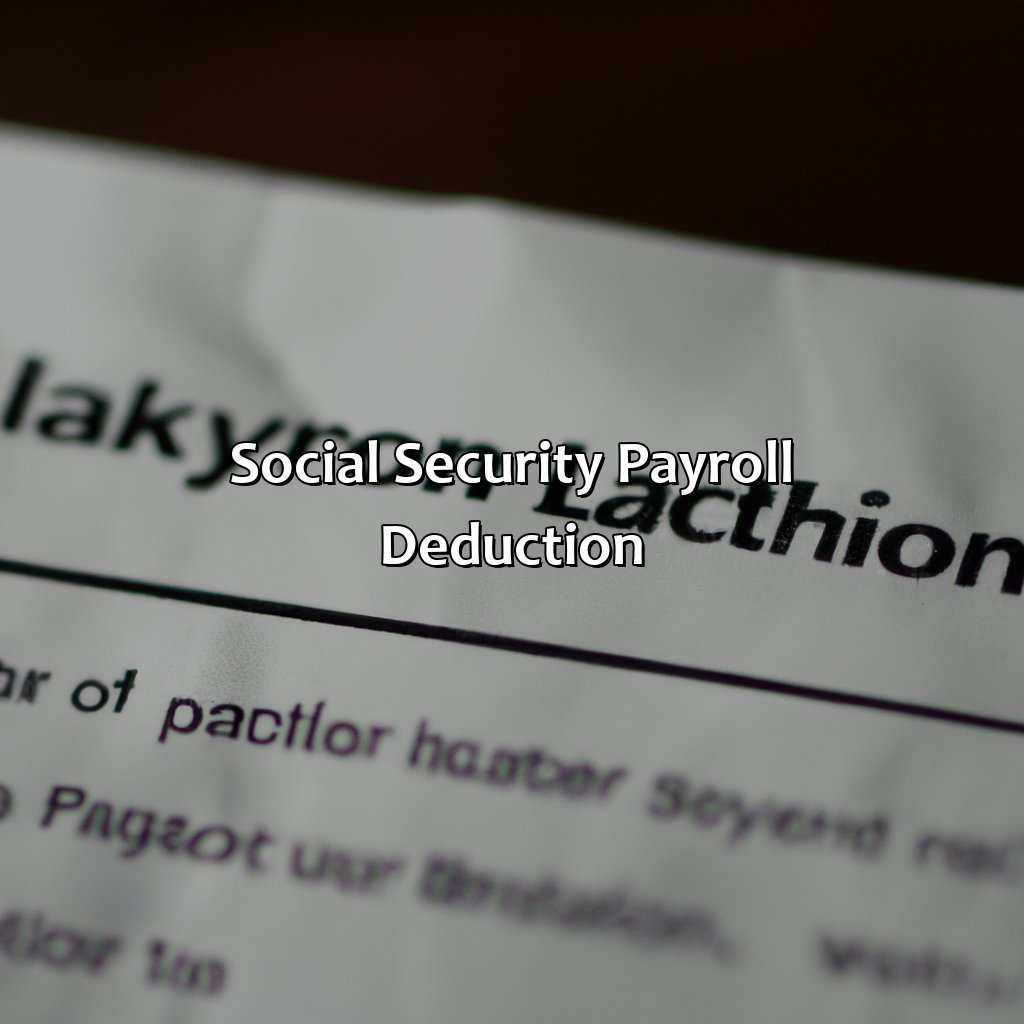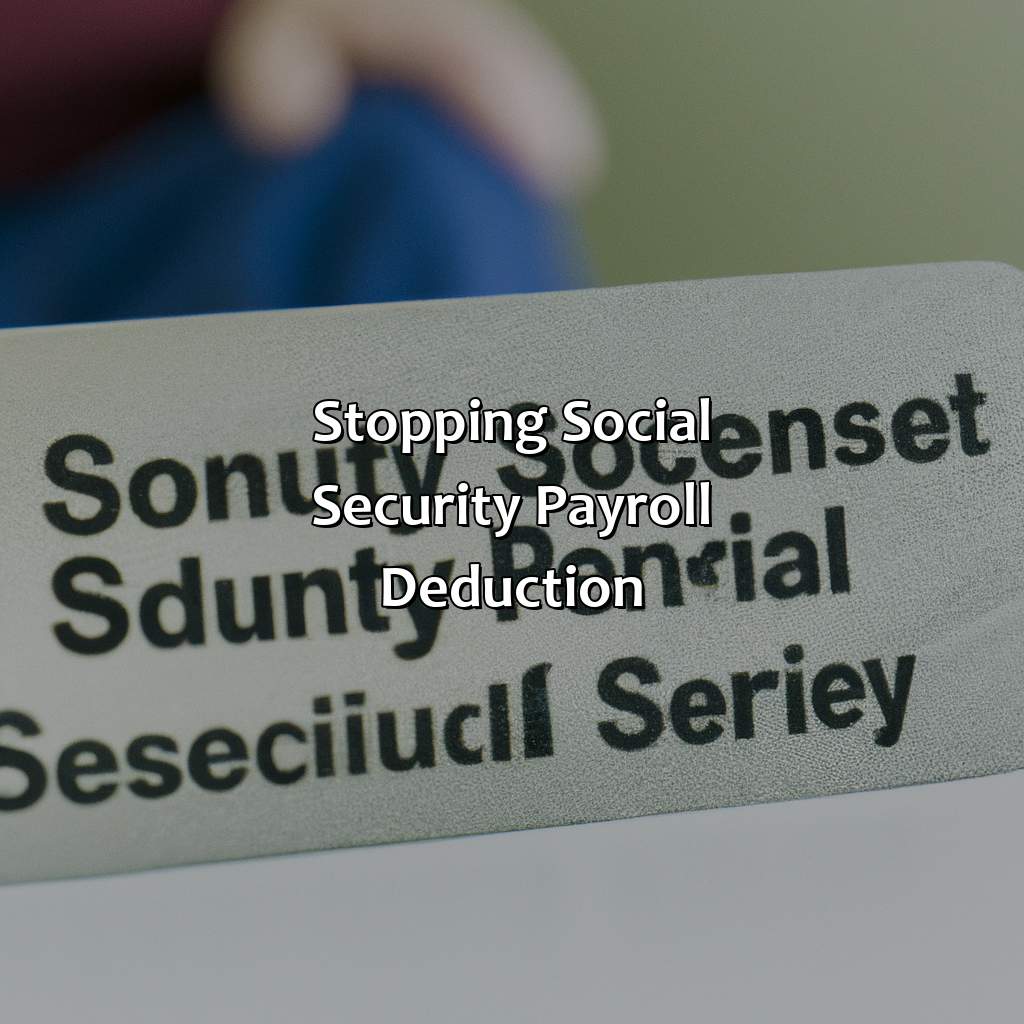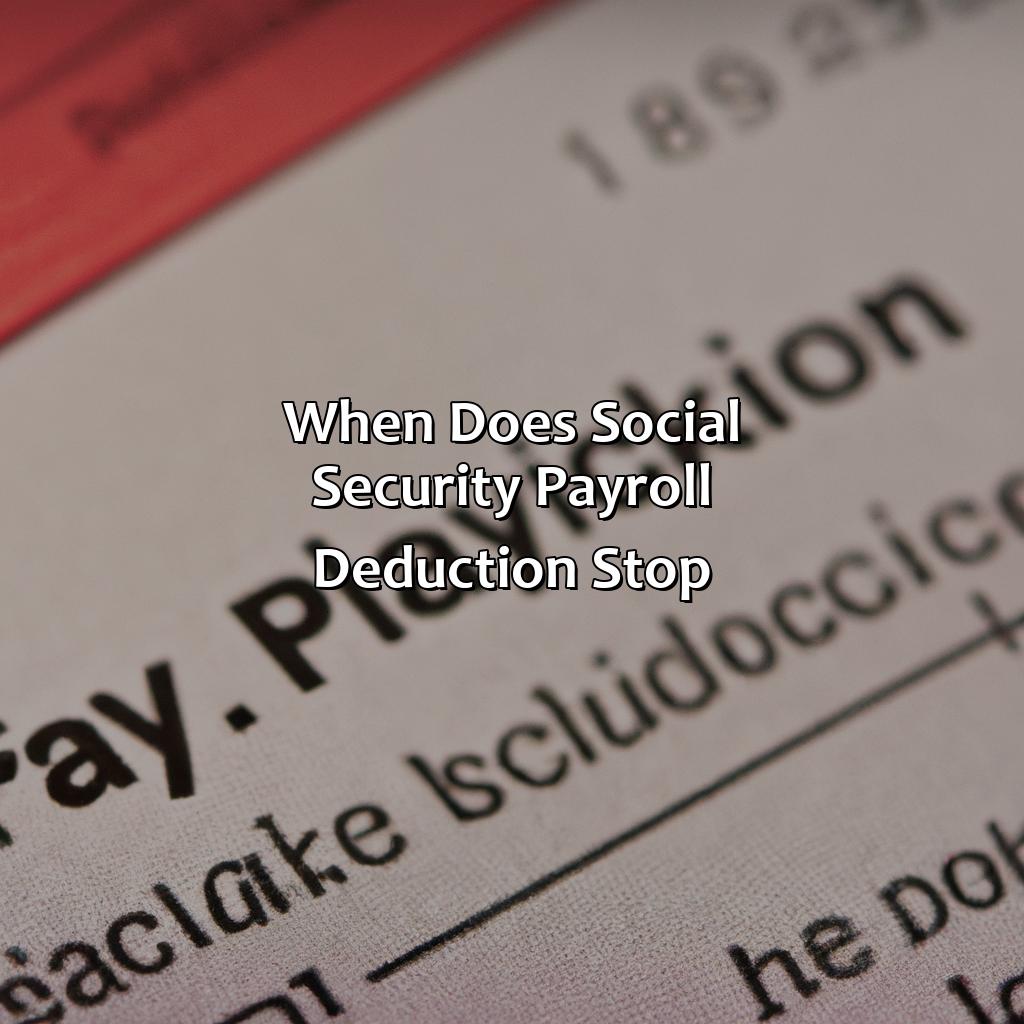When Does Social Security Payroll Deduction Stop?
Key Takeaway:
- Social Security payroll deduction stops when you have reached the maximum taxable earnings for the year. For 2021, the maximum taxable earnings is $142,800.
- If you switch jobs or become self-employed, you may have to re-start your social security payroll deduction. It is important to keep track of your earnings and ensure that you are not overpaying or underpaying.
- If you have reached the maximum taxable earnings and your deduction has not stopped, you can contact your employer or the Social Security Administration to resolve the issue.
Are you concerned about when your social security payroll deductions will stop? You deserve to have peace of mind when it comes to retirement. This article provides you with the necessary information to understand when your payroll deductions will end.
Social Security Payroll Deduction
To comprehend Social Security payroll deduction, you must know who pays the taxes and how they’re calculated. To get a better understanding of this concept, we’ll discuss two topics:
- Who Pays Social Security Taxes?
- How Social Security Taxes Are Calculated.
This should answer any questions you have about SS payroll deduction.

Image credits: retiregenz.com by Harry Duncun
Who Pays Social Security Taxes?
It is mandatory for employees and their respective employers to pay Social Security taxes. This tax system acts as an insurance program that provides benefits such as retirement, disability, and survivorship. Simply put, Social Security taxes are paid by those who work in the United States, including those who own or operate a business.
The amount of Social Security tax collected from an individual’s salary is determined by the Federal Insurance Contributions Act (FICA) tax rate. In 2021, employees and employers pay a total of 12.4% of an employee’s gross income, with each contributing 6.2%. Additionally, self-employed individuals pay both the employer and employee portions of the tax for a total contribution of 12.4%.
It is crucial to note that there is a limit on how much wage income is subject to Social Security taxes annually. This limit changes every year; In 2021, it is $142,800.
Social Security taxes are essential in ensuring financial security during one’s golden years. Without them, retirees may have inadequate income streams in their lifetime. One must understand the significance of paying these taxes for not only themselves but also their future generations.
A friend of mine forgot to update their marital status with their employer after getting married overseas. As a result, her employer deducted more than required for Social Security payroll taxes throughout that fiscal year since she had already reached her maximum taxable earnings limits under her previous withholding rate based on single status rather than married status withholding rates provided by FICA guidelines.
Why bother calculating how much you’ll owe in Social Security taxes when you could just buy a crystal ball and let it do the math for you?
How Social Security Taxes Are Calculated
Social Security taxes are calculated based on the wage or salary earned by an employee. The Social Security tax rate is 6.2%, and it applies to the first $142,800 of an individual’s income in 2021. Anything that is earned beyond that threshold will not be subject to Social Security payroll tax. Employers match the employee’s contribution with a similar amount of 6.2%. Self-employed individuals pay both employee and employer shares for a total rate of 12.4%.
Additionally, there is an additional Medicare tax of 1.45% on wages or salary earned above $200,000 for individuals and $250,000 for married couples filing jointly. This tax is not matched by employers.
It is worth noting that Social Security payroll deduction only stops when an individual retires, becomes permanently disabled or dies. Once an individual reaches the full retirement age, they will no longer have payroll taxes taken from their checks.
Lena had been working as a receptionist in a firm for over three decades before retiring at age seventy-two. She did not have any knowledge regarding social security taxes calculation but knew that she had contributed enough over the years to receive benefits in her senior years. Her knowledge gap resulted in less financial planning leading up to her retirement, which made her transition quite challenging financially as compared to those who were well-informed about social security deductions throughout their careers.
Stop social security payroll deductions? Might as well try stopping a train with a feather.
Stopping Social Security Payroll Deduction
Curious about when and how to stop Social Security Payroll Deduction? Let’s delve into it.
There are various reasons why Social Security Payroll Deduction may stop. We’ll look into the solutions for ceasing the deduction.
If you want to know the reasons for termination and the process to follow, then we have the answers.

Image credits: retiregenz.com by Harry Jones
Reasons Social Security Payroll Deduction May Stop
When will Social Security Payroll deductions cease? There are a variety of situations in which the payroll deduction may stop. Those who reach full retirement age, those who become disabled and are receiving disability benefits, and those who opt to suspend their benefits until a later date may all stop having their payroll deducted. Additionally, if you’re still working and have reached your full retirement age, Social Security will adjust your benefit amount by excluding specific months when you didn’t receive benefits due to excess earnings.
It’s important to note that while certain circumstances allow for an end to payroll deduction, it doesn’t mean that your benefits will be cut off entirely. It’s likely that you’ll continue receiving monthly payments for the remainder of your life. If you’re uncertain about when your social security payment will stop or have any other inquiries concerning it, make sure to contact the Social Security Administration directly.
Plan wisely for retirement because obtaining a decent pension is critical. You don’t want to run out of funds in your later years when you require them the most. Contact Social Security right away if there seems to be any miscommunication with your account so that you can avoid missing out on crucial time-sensitive information.
Stop adding to your retirement fund by stopping social security payroll deductions – it’s like quitting smoking, but for your bank account.
How to Stop Social Security Payroll Deduction
Stopping Social Security payroll deduction can be confusing for many individuals. To cease these payments, there are a few steps to follow.
- Contact your employer’s HR department and inform them of the change you want to make.
- Fill out form SSA-1214, which is the “Statement of Termination/Cancellation of Election for Voluntary Deduction”.
- Submit the form to your employer’s payroll department.
By following these steps, you can successfully stop Social Security payroll deduction. It is essential to note that this process may take up to a month to take effect fully.
Furthermore, as an alternative option, you can call the Social Security Administration at 1-800-772-1213 or visit their website to stop deductions from your benefits payment directly.
It is worth mentioning that penalties may apply if you do not complete this process correctly or in a timely manner.
According to Investopedia, Social Security payroll deductions fund retirement, disability, and survivors’ benefits of beneficiaries in monetary need.
Five Facts About When Does Social Security Payroll Deduction Stop:
- ✅ Social security payroll deduction stops when an individual reaches full retirement age, which ranges from 66 to 67 depending on the year of birth. (Source: Social Security Administration)
- ✅ If an individual continues to work and earn income after reaching full retirement age, they will no longer have social security payroll deductions. (Source: AARP)
- ✅ The amount of social security payroll deductions depends on an individual’s income and is set at 6.2% of earnings up to a certain limit. (Source: Internal Revenue Service)
- ✅ Social security payroll deductions can be stopped temporarily for individuals on a leave of absence without pay. (Source: Social Security Administration)
- ✅ Social security payroll deductions can also be stopped permanently for individuals who have a qualifying medical condition and are no longer able to work. (Source: Social Security Administration)
FAQs about When Does Social Security Payroll Deduction Stop?
When does social security payroll deduction stop?
Social security payroll deductions stop when you reach your full retirement age or after you have earned enough credits to qualify for retirement benefits.
Can I stop social security payroll deductions before reaching the retirement age?
No, you cannot stop social security payroll deductions before reaching the retirement age. These deductions are mandatory and continue until you retire.
What is the retirement age for social security payroll deduction?
The retirement age for social security payroll deduction varies depending on the year you were born. You can find your full retirement age on the Social Security Administration’s website.
Can I opt-out of social security payroll deduction?
No, you cannot opt-out of social security payroll deduction if you are an employee. These deductions are mandatory, and your employer is required by law to withhold the taxes.
Can self-employed individuals stop social security payroll deductions?
Self-employed individuals cannot stop social security payroll deductions, but they can deduct half of the self-employment taxes on their income tax return.
What happens to social security payroll deductions after I retire?
After you retire, your social security payroll deductions will stop, and you will receive retirement benefits from the Social Security Administration based on your work history and earnings record.


